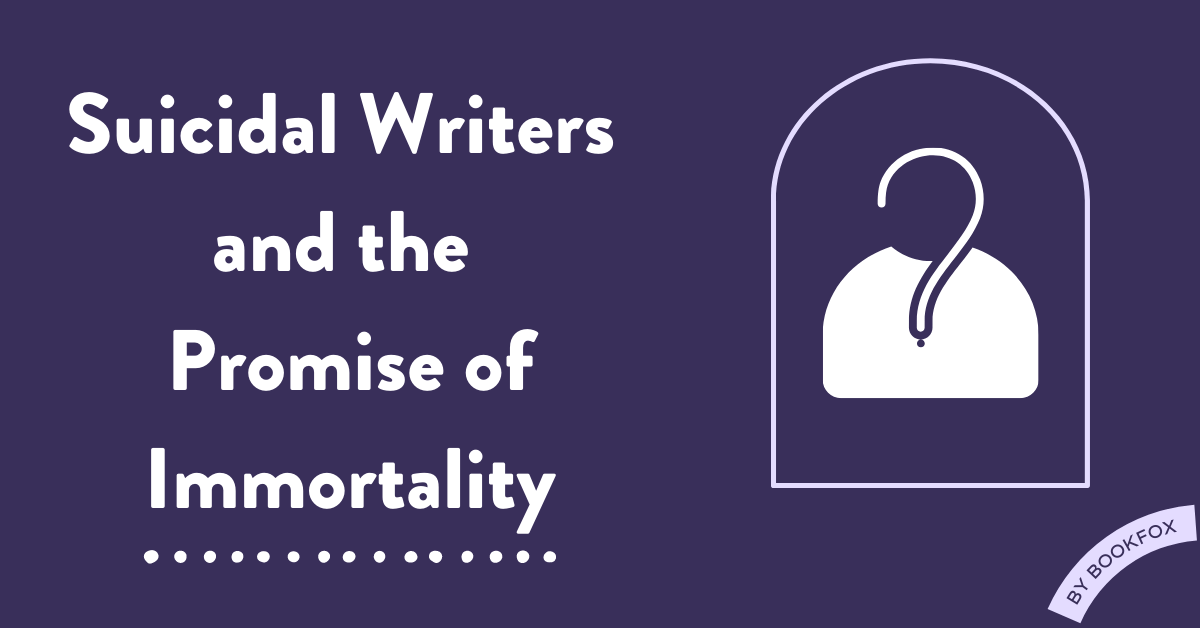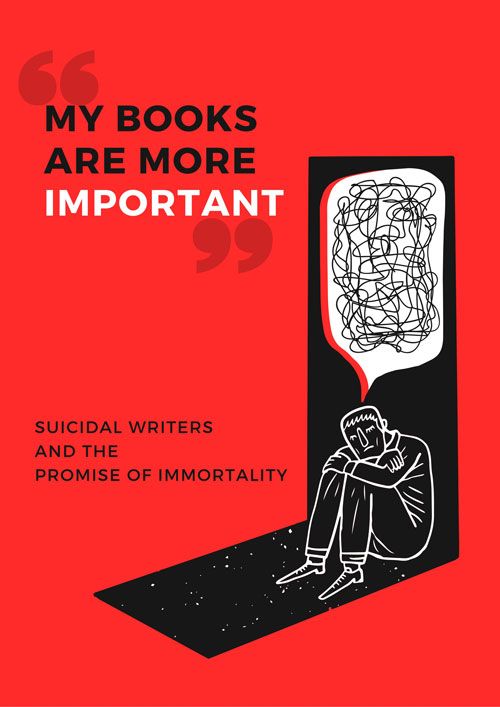
 What would you do if a writer emailed you saying they were going to commit suicide?
What would you do if a writer emailed you saying they were going to commit suicide?
It happened to Cynthia McCabe, a journalist at the Washington Post.
She was in bed one night, checking her email, and read an email from a complete stranger named Dennis Williams who said that he’d published one novel that no one had read, written 8 other unpublished books, and that he was committing suicide that very night.
Why? Because Williams had said all that he had to say. Because he considered his life work to be bound up in those 8 unpublished books and one published novel, and if no one was going to listen, he would commit suicide.
In fact, the only reason he was emailing Cynthia McCabe was in the hopes that she might draw attention to his work after his death. In essence, his life wasn’t important, only his work.
Does any of this idealistic thought sound familiar to you writers? Because I recognize it. I’ve valued the importance of my work that highly at certain times in my life, certainly when I was younger. You think that this one book is it, that it contains everything you’ve been working for throughout your life, and if you could just communicate it to others it would change the world … and, you know, earn you millions of dollars, which would be nice, too, I guess.
Well, Cynthia McCabe didn’t know what to do. Williams was in Japan, and she couldn’t get there. But she did some sleuthing and found his niece on Facebook, and sent her a message asking her to reach out to her suicidal uncle.
Cynthia didn’t hear back for a few days, until the niece sent her a message thanking her for her concern, and saying that her Uncle had committed suicide.
Apparently, Williams had sent that email, then climbed to the top of his building and jumped off.
In a note to his niece and to his ex-wife, Williams said that he’d said all that he wanted to say. Through his books. And since his books were finished, he was finished, too.
What a strange conflation of his self with his work.
If there’s one thing we have to remember as writers, it’s that our work and our selves are not the same thing.
- When you get a rejection note from an agent or magazine, they are not rejecting you.
- When your book fails to sell, it’s not because people dislike you.
- Even if you’re a terrible writer and no one ever reads you, you are probably still a decent, lovable human being who can make great changes in the world.
Why do we forget that so often?
Well, Williams, it turned out, had a daughter. He didn’t raise her and they were estranged from each other. One of those things when they communicated every five years, or so, and it was awkward. You probably know some relationships in your family like that, too.
I find it infinitely sad that he didn’t have a relationship with his daughter, and yet craved a relationship with thousands of readers who he could never know. Now I don’t know the specifics of that relationship, and maybe there was good reason why she didn’t want to have a relationship with her father, but from his point of view I find it reveals some inverted values.
I mean, what has more chance of mattering? Your books or your relationships?
Don’t buy into the myth of genius. Don’t sell your family out for the longshot hope of fame. By choosing his books over his daughter, Williams was choosing his ego over selflessness.
Because let’s be honest:
Everything you write will disappear. Pretty quickly, actually. Almost certainly within your lifetime. If you are extremely, extremely lucky, someone might read you after you’re dead. But let’s be honest — a hundred years from now, I can wager with absolute certainty that no one reading this blog post will still be read.
Depressing? I hope not! I am nothing if not a cheerful soul brimming with optimism!
Because I’m telling you that not to depress you but to free you. If you don’t have the pressure of writing to posterity, you can actually write for the now. Write for those who will read you now. Communicate with people around you, engage the topics of the day. And screw posterity! What has she ever done for you?
Celebrate your writing whether it reaches 10 or 10 million.
But at the same time you celebrate it, realize that the actual relationships you have with others — your family, your friends — are infinitely more important than your writing. This is harder to do than it looks. For instance, I’m staying up late at night to write this, even though my twins are turning 4 tomorrow. Which means I’m choosing this post over being well-rested for their birthday.
So Dennis Williams is still, even after his suicide, unknown. His single book on amazon is figuratively collecting dust. There is, however, a single five-star-review.
You know who wrote that review? His daughter.
That just hurts.
Can you feel how much she craved a connection with her father?
Don’t let your friends and family read your books as a substitute for yourself. It’s not worth it.
Read and listen to the original story, as told on NPR’s Snap Judgment

3 comments
I really appreciated reading this article. Although I write and have a couple books out there …….I have yet to think anything i say, or said is more important than what I might say later on down the line………I love hearing successful people in all walks of life say their best work……..IS THEIR NEXT WORK………We must all keep that in mind. Experience is the best teacher. Who knows what incite is just around the corner.
What a sad tale! And a cautionary one about what happens when we wrap up our identity in our story-writing work.
The irony is, @ least i.m.h.o., that we need to get a bit of mental distance from our work. Why? Because it’s not only good for our emotional health & relationships, but for our writing as well.
How tragic that this man’s connection with his brain-children was so much closer than his relationship with his flesh-and-blood child. Great comment about posterity. How is posthumous fame going to benefit you or your loved ones?
Congratulations to the boys 🙂
We all have reasons for writing, and for wanting what we wrote to be read by someone (or we’d be happy with a journal).
People forget that the things in life that are hard, that force us to grow as people, also grows us as writers.
Very little in life is just black and white, yes or no, perfectly good or perfectly evil. Life is more complex than that. The best characters (heroes and villains alike) are just as complex.. with goals, and hopes, and dreams.. Some of those frustrated ones that might make us blind to things that are right in front of us..
Like this writer’s dream of connecting to his readers.. and in the process losing out on the very real connections with those who longed to be close to him.
I can’t identity with having nothing left to say, being out of ideas. I hope I never will. I have to wonder if he wouldn’t have found he had a lot more to say if he’d taken a break from writing, and worked at life for a bit. At doing the every day stuff we all have to do.. and the little surprises that make the best memories..
Writing about it later is only icing on the cake.. 😉
Being published (and read by someone, even if it is just our kids!) is also icing, not the cake itself..
My kids write fan fiction. The staggering amount of people who have read their stories is probably a little unfair.. That might carry more of a sting, if it wasn’t so much fun for me to read what they write.. Jealousy does not trump pride and growing from critiquing their stories for them 😉
Also, I have built-in fans for my stories! Even if it’s just the three of them : )
I wish Dennis Williams had given himself the time to find that with his daughter..
I don’t know how old your twins are.. but seriously, it’s fun.. and a great way to keep talking during that time when you can do or say so little right (Teens.. I’m looking at YOU..)
Anyway..
Speaking of icing and cakes..
Go have some cake and icecream 😉